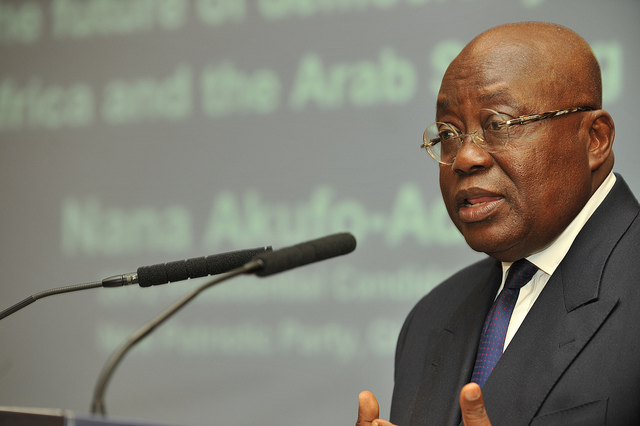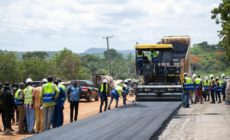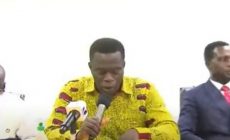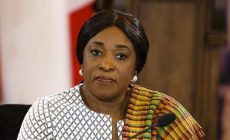Nana Akufo-Addo to gov’t: Pursue efficient management of resources
- Posted on
- Comment
 At a symposium organised by the Royal African Society and the Centre of African Studies in London, Nana Addo Dankwa Akufo-Addo on Monday advised government to pursue efficient management of its resources and projects in order to restore confidence in the troubled economy.
At a symposium organised by the Royal African Society and the Centre of African Studies in London, Nana Addo Dankwa Akufo-Addo on Monday advised government to pursue efficient management of its resources and projects in order to restore confidence in the troubled economy.
The 2012 presidential candidate of the New Patriotic Party (NPP), who was speaking on the theme ‘Ghana, 57 years after 1957: Recalibrating the Course of Progress’ admonished government to “do more to let Ghanaians know that public leadership is a vehicle for the pursuit of the common good and not for self-enrichment.”
In an eloquent speech, Nana Akufo-Addo, who is rumoured to be back in the country on Thursday after months of political sojourn in London, also underscored the need to “build a stronger sense of national pride, a greater sense of unity, a stricter sense of responsibility, and a richer sense of genuine ownership among Ghanaians.”
“In our homes, in our communities, in our workplaces, we must encourage the development of a set of patriotic values that push us to do more; reward creativity and success, and, above all, make the creation of an equitable society of opportunities and aspirations for every Ghanaian, irrespective of the circumstances of birth, the bedrock of our nation building. We must build and be seen to be building a Ghana for all Ghanaians”, said Akufo-Addo.
‘Frustrating challenges’
Nana Akufo-Addo, believes Ghana’s future development is tied to the country’s ability to overcome three hurdles that he calls ‘frustrating challenges’.
“The first is the institutional challenge. A paramount concern of our time has to be the consolidation of Ghanaian democracy, requiring the strengthening of our institutions of state, particularly, in their capacity to deliver results and to be accountable to the people. The most direct way of so doing is for all Ghanaians to accept to play by the rules we have set for ourselves in our national constitution and in our laws.”
According to him, playing by those rules also means meticulously enforcing them.
“By this, we can deal with corruption and abuse and theft of public funds. It is critical to the process of recalibrating the course of Ghana’s progress. We must have a public sector that is efficient in delivering universal access to good quality education, healthcare, legal remedies, personal security and basic infrastructure.”
The second challenge, according to him, is the country’s inability to transform its economy.
“Today’s digital revolution and the fierce pace of technology mean that knowledge, skills, technology, creativity and capital have become very mobile, making them more important in determining where production takes place rather than the location of natural resources. How ready are we, though, to meet the challenge to our ability to promote national prosperity and protect national security?” He quizzed.
He blamed the large numbers of youth unemployment in the country to “a failed educational system that does not provide them with the requisite skills and a structurally rigid economy that simply cannot generate the large pool of good jobs with good pay.”
In his view, it would be “suicidal” if policy makers do not move quickly to address the current spate of youth unemployment in the country.
“The third challenge is a cultural and intellectual one”, notes Nana Akufo-Addo.
He said the country’s value systems as well as the individual and collective commitment of citizens to its wellbeing is poor.
“How strong do we live by our values? And what are these values, really? We must garner the courage to elevate the operative principles and standards of our society. After all our daily prayers and finger pointing, why do we allow the paying of bribes to be a tolerable social behavior? So far we have devalued our values to allow people to get away with it. It is time to be deliberate in setting a higher bar for ourselves and, especially, for our leaders”, he suggested.
Cedi is ‘butt of many jokes’
Currently, the cedi has been competing with Manchester United coach, David Moyes, in being the “butt of many jokes”, says the twice defeated presidential hopeful.
In his view, beyond having Ghana’s economy managed by a competent team, the structural weakness of the economy must be fixed to keep the currency predictably stable.
”We must re-imagine what Ghana can be like in the 21st century and re-dedicate ourselves to building that new Ghana”, he stated.
“Our country has everything it needs to progress. Ghana is ready and so must its leaders be. I am confident that the future for Ghana is brighter than the dream of 1957 and I know that this century is the era of our manifestation.”
The symposium was chaired by Lord Paul Boateng, of the British Labour Party.
Foreign Minister, Hannah Tetteh and Ghana’s High Commissioner to the United Kingdom, Prof Danso-Boafo, were among the many dignitaries who graced the occasion.
Author: George Nyavor










 (Selorm) |
(Selorm) |  (Nana Kwesi)
(Nana Kwesi)